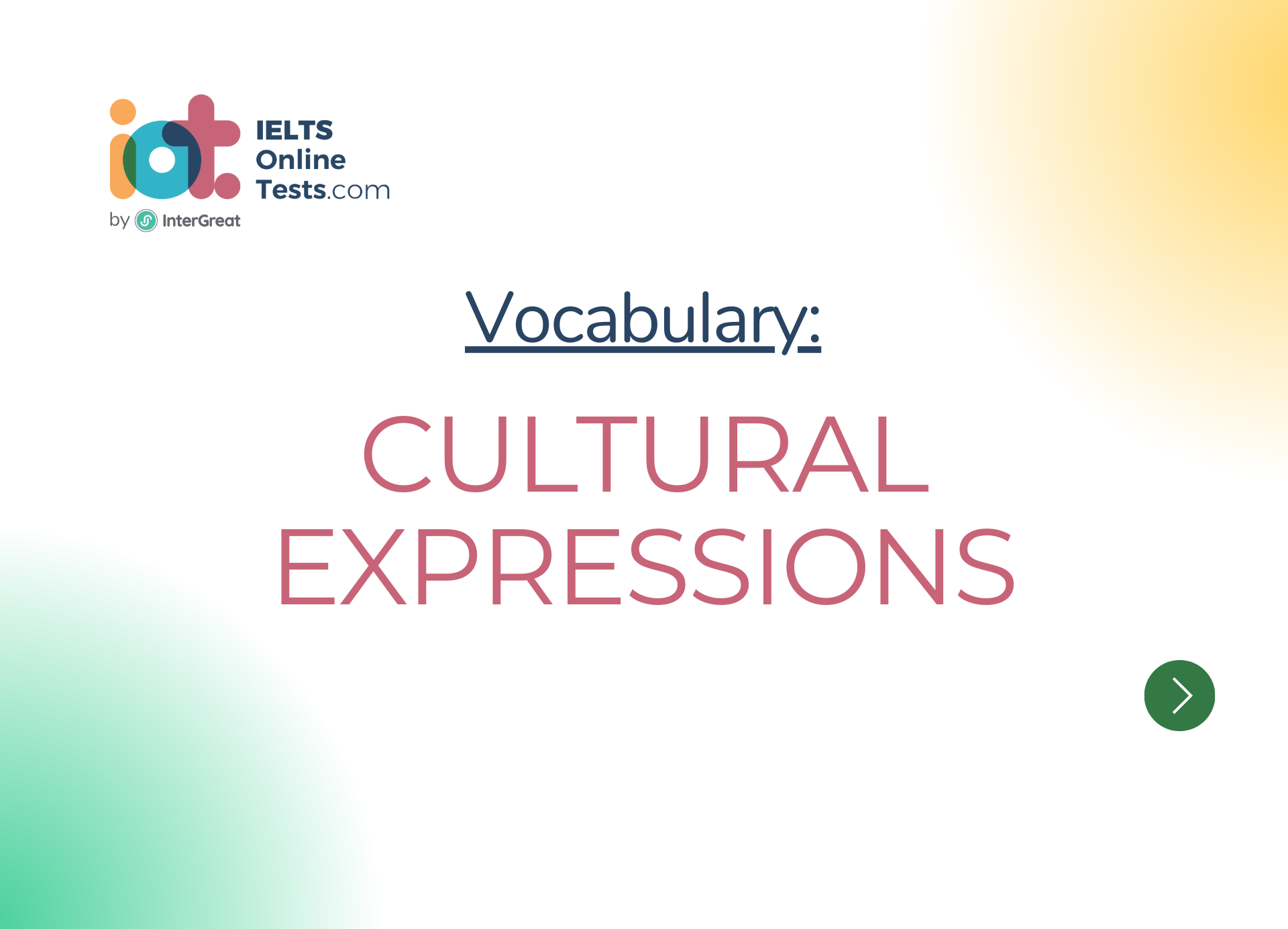
Cultural expressions
Here are some vocabulary words related to cultural expressions, suitable for IELTS band scores 4.5-6.0:
Tradition:
Customs, beliefs, and practices handed down from generation to generation.
Custom:
A specific practice or behavior that is common in a particular culture or community.
Ritual:
A set of actions or ceremonies performed in a particular order, often for religious or cultural reasons.
Festival:
A celebration or event that is usually linked to religious, cultural, or seasonal significance.
Ceremony:
A formal event or ritual often performed for a special occasion or to mark an important event.
Cuisine:
The traditional food and cooking style of a particular culture or region.
Music:
The art of combining sound and rhythm to create expressions of emotion and ideas.
Dance:
Physical movement and expression often accompanied by music or rhythm.
Art:
The expression of creative imagination through various mediums such as painting, sculpture, and literature.
Craft:
Skilled work, often done by hand, to create decorative or functional objects.
Language:
A system of communication used by a particular country or community, with its own set of rules and vocabulary.
Mythology:
A collection of traditional stories, often involving gods or heroes, explaining the beliefs and values of a culture.
Folklore:
The traditional beliefs, customs, and stories of a community, passed down orally from generation to generation.
Cultural Identity:
The sense of belonging and identification with a particular cultural or ethnic group.
Heritage:
The cultural traditions, customs, and artifacts that are inherited from past generations.
Religious Practices:
Rituals and activities related to religious beliefs and traditions.
Cultural Norms:
Accepted standards and behaviors within a specific culture or society.
Cultural Values:
The beliefs and principles that a culture considers important and worthy.
Cultural Exchange:
The sharing of ideas, customs, and traditions between different cultures.
Cultural Diversity:
The existence of multiple cultures and ethnicities within a society or region.
Multiculturalism:
The coexistence and recognition of different cultural groups in society.
Folk Music:
Music that originates from the traditions of a specific cultural group.
Indigenous:
Originating or native to a particular region or culture.
Cultural Heritage:
The physical and intangible aspects of culture that are preserved and passed on to future generations.
Artistic Expression:
The use of art to convey emotions, thoughts, and ideas.
Cultural Symbols:
Objects, images, or actions that represent specific meanings within a culture.
Folk Dance:
Traditional dances that are part of a community's cultural heritage.
Cultural Performance:
Artistic or creative presentations that reflect the traditions of a culture.
Language Diversity:
The existence of multiple languages spoken within a society or region.
Cultural Sensitivity:
Being aware and respectful of cultural differences and avoiding cultural stereotypes.
Cultural Artifacts:
Objects or items that hold cultural, historical, or artistic significance.
Cultural Awareness:
Being conscious of and sensitive to the cultural differences and diversity around you.
Folk Tales:
Traditional stories passed down through generations, often involving mythical characters and life lessons.
Cultural Integration:
The blending and harmonious coexistence of different cultures within a society.
Cultural Assimilation:
The process in which individuals adopt and incorporate the cultural norms and practices of a new society.
Cultural Influences:
The impact that a particular culture has on the beliefs, behaviors, and traditions of another.
Cultural Appreciation:
Recognizing and valuing the customs and practices of other cultures.
Cultural Identity:
The sense of belonging and attachment to one's cultural heritage and values.
Folklore Dance:
Traditional dance forms that reflect the cultural heritage and history of a community.
Folk Art:
Artistic creations that emerge from the cultural traditions and everyday life of a community.
Cultural Exchange Programs:
Initiatives that facilitate the sharing of cultural practices and experiences between different communities or countries.
Cultural Celebration:
Festivals and events that showcase and honor a culture's unique customs and traditions.
Cultural Understanding:
The comprehension and knowledge of the values, beliefs, and practices of different cultures.
Cultural Identity Crisis:
A period of uncertainty or conflict related to one's cultural identity.
Cultural Integration:
The process of incorporating and adapting to the customs and values of a new culture.
Cultural Tolerance:
Showing respect and acceptance towards cultural differences.
Cultural Belonging:
Feeling accepted and included within a specific cultural group.
Cultural Exchange Student:
A student participating in a program that allows them to study abroad and experience different cultures.
Cultural Heritage Sites:
Places of significant cultural importance that are preserved for future generations.
Cultural Sensitivity Training:
Educational programs aimed at promoting understanding and respect for diverse cultures.
Cultural Diversity Training:
Programs designed to enhance knowledge and awareness of cultural differences in the workplace or community.
Remember to practice using these words in context to improve your understanding and usage of cultural expressions vocabulary. Understanding and appreciating different cultural expressions will enable you to discuss and engage with various aspects of culture during the IELTS exam. Good luck with your preparation!




